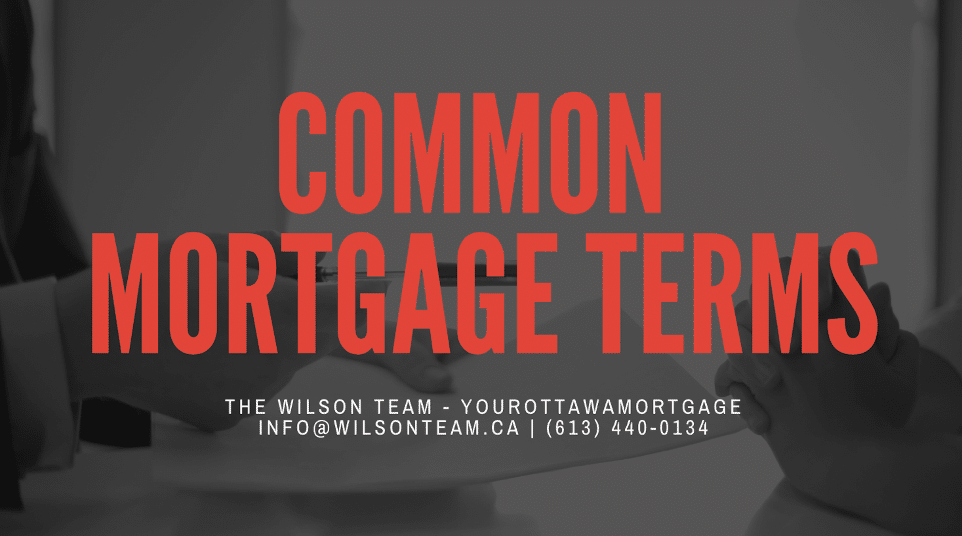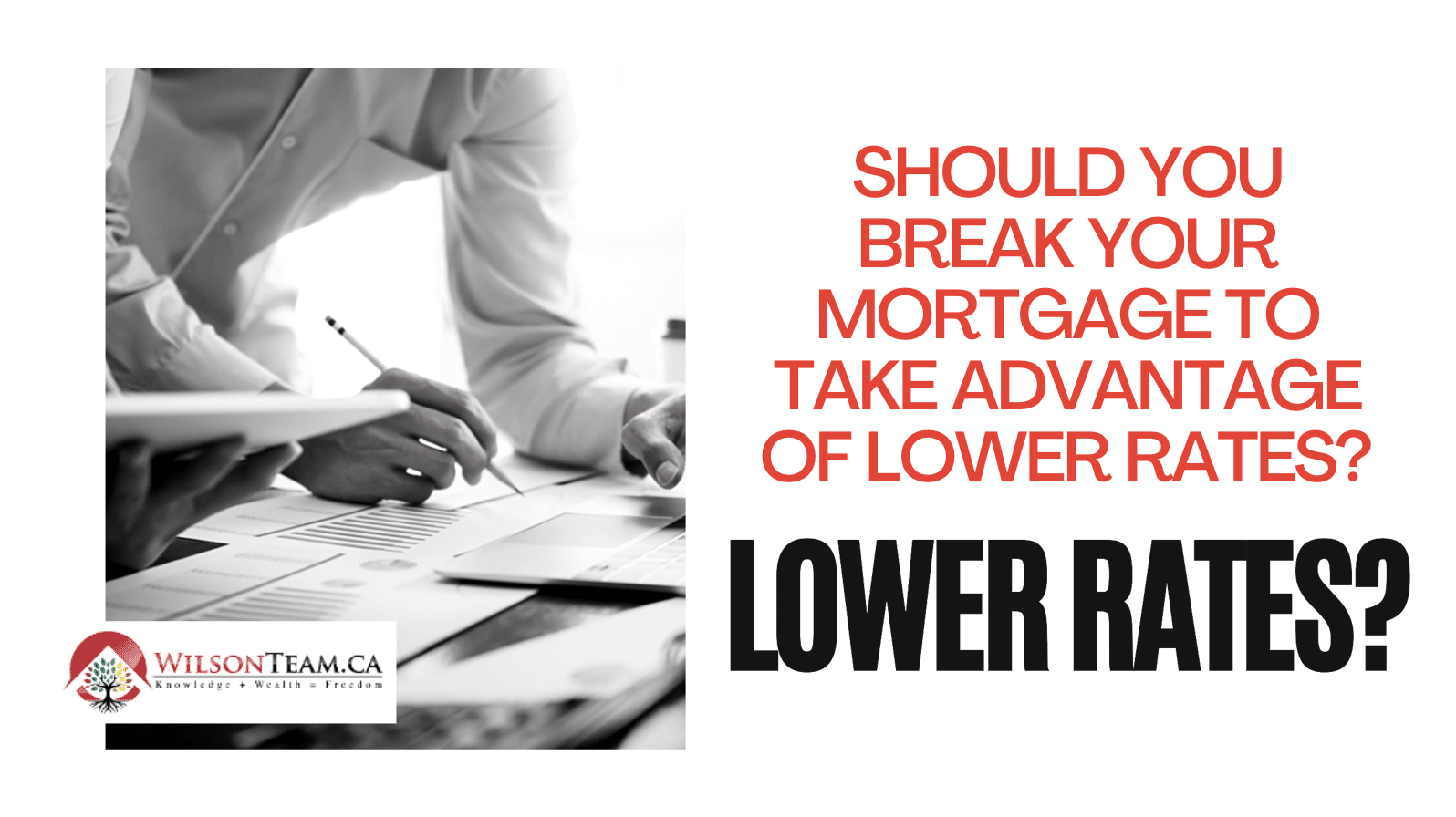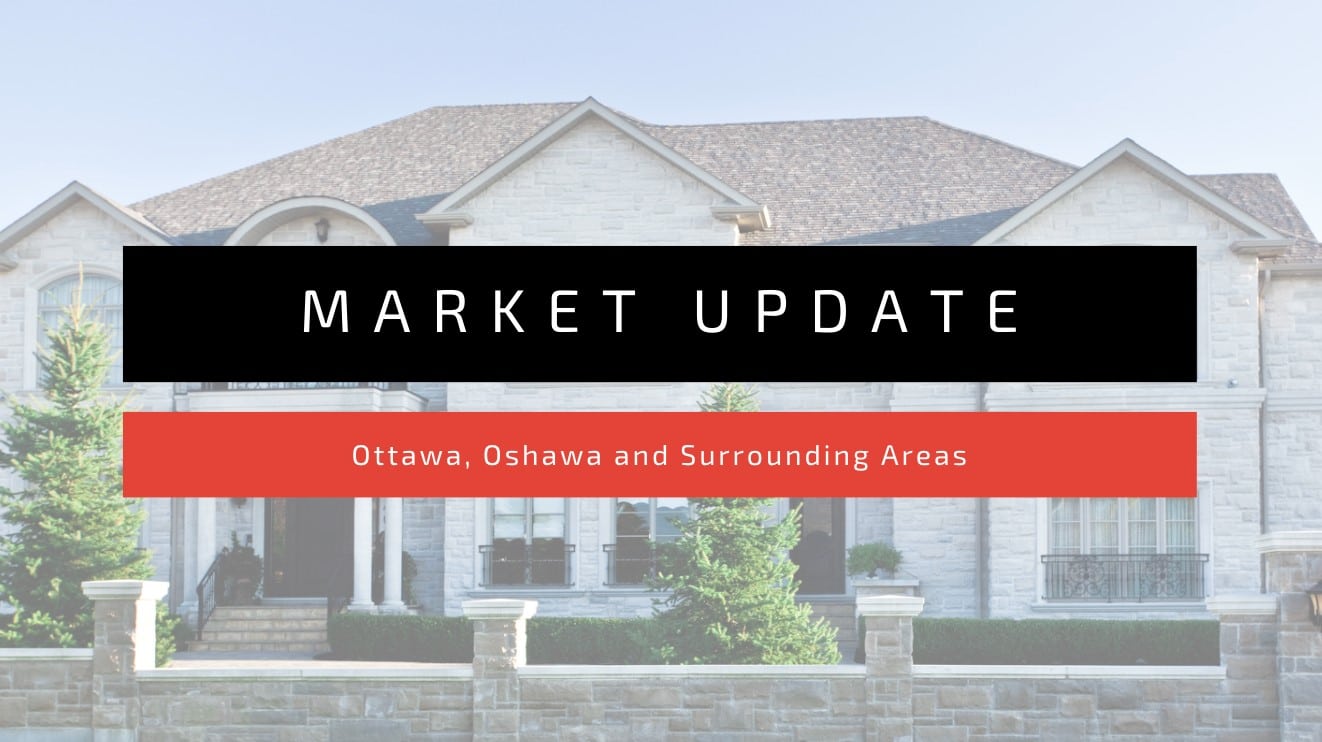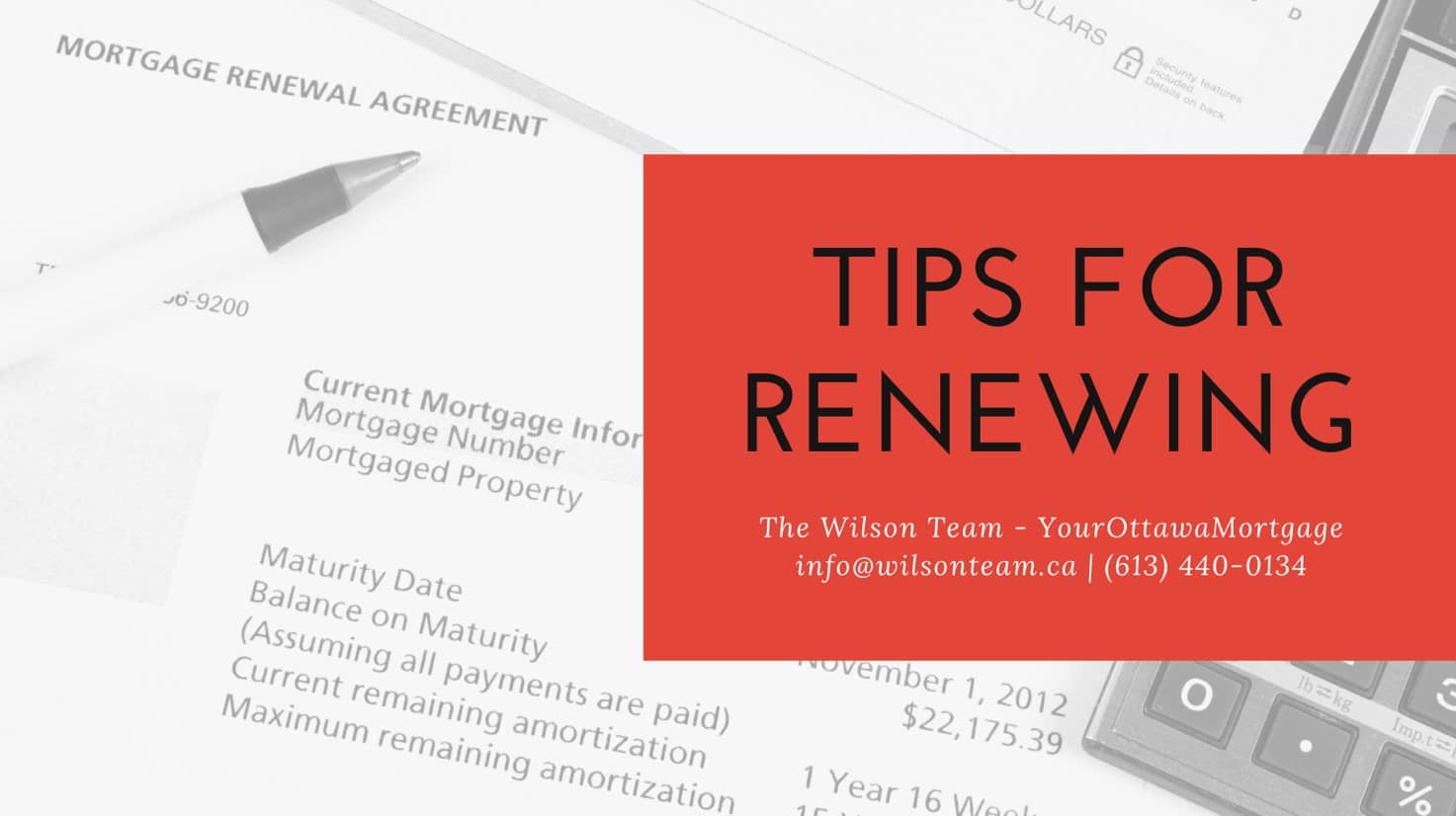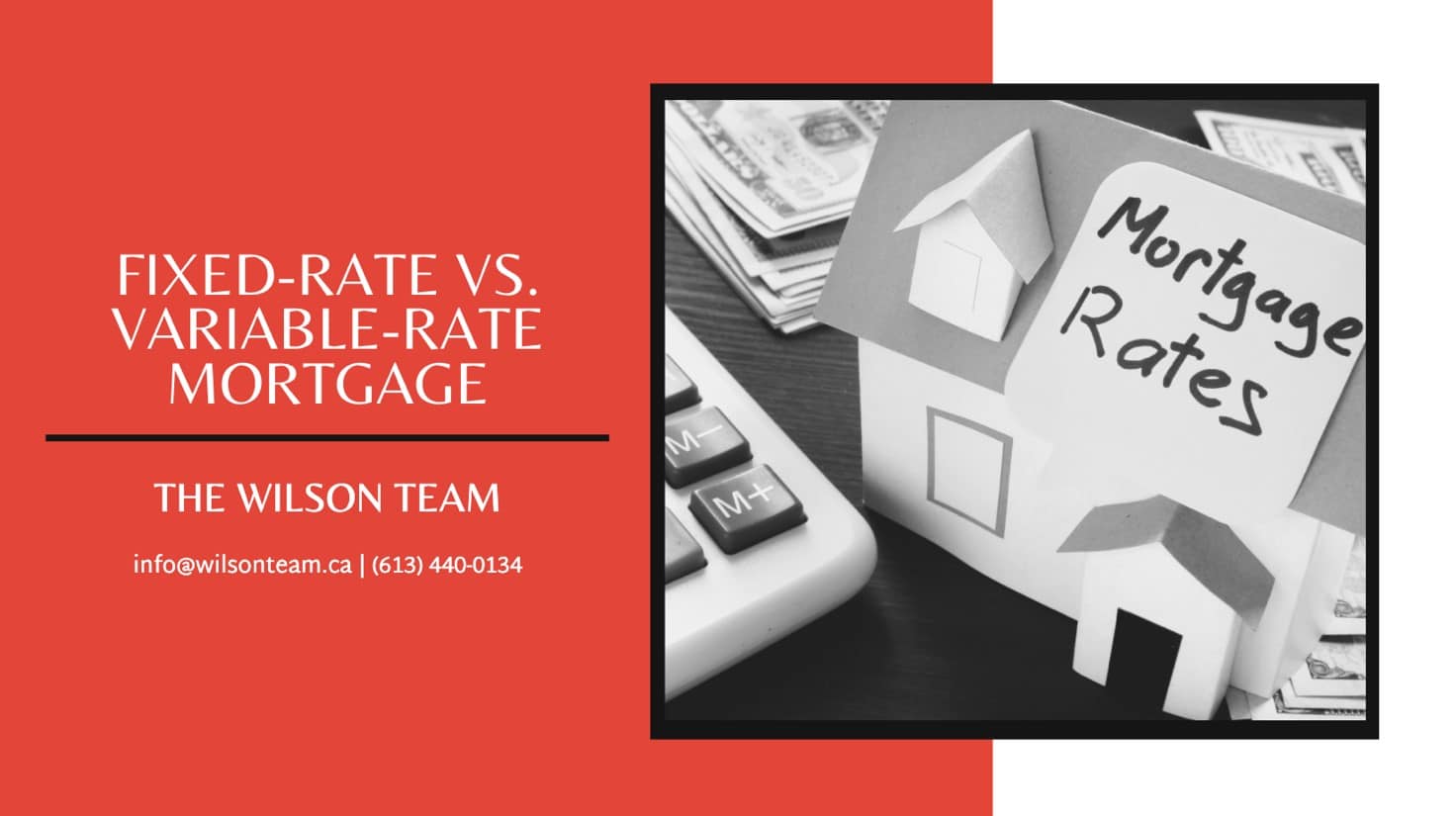Common Mortgage Terms
As an Ottawa mortgage broker, I help home buyers find the best mortgage term for their needs. Mortgage term refers to the length of time that you will remain committed to a mortgage rate and the conditions that have been outlined by the lender. Mortgage terms in Canada can run from six months to ten years. The most popular mortgage term is a 5-year mortgage, with 2 to 4-year terms coming in second. Once that term expires, you will need to renew your mortgage, which will be based on the principle still owed. It's fairly standard for Canadian homeowners to renew their mortgages several times over the life of the mortgage.
Choosing a Mortgage Term
So, how do you choose the right mortgage term for you? This is down to your financial situation, what your long and short-term goals are, and your risk tolerance. Some will go for a long-term loan if they want to lock in a good interest rate. Some will go for a short-term mortgage rate because it gives them more flexibility. If you think there is a chance of selling your home in the next few years, a short-term mortgage can be more beneficial because you won't have to pay a prepayment penalty.
It's important to keep in mind that the interest rate you get is directly affected by the term time that you choose. Generally speaking, short-term mortgages have lower rates of interest, whereas a longer-term mortgage will have higher rates. Saying that a long-term mortgage offers more protection when interest rates fluctuate.
Mortgage Rate Qualification
In January of 2018, the mortgage stress test was brought in by Canada's federal banking regulator. Before this, only those who put down less than 20% of a down payment were subject to this stress test. However, homeowners now have to qualify at a rate that is higher than what their mortgage provider has given them. This adds 2% points to the rate your lender gives you. For example, your bank or broker offers you a rate of 3.09%. This means you would have to qualify (be able to afford) at 5.34%
Breaking a Mortgage Term
There will always be times when personal situations change and you are in a situation where you have to end your mortgage term early. This may be down to moving, having to refinance, or a major life event. You may be subject to a pretty hefty prepayment penalty for breaking your mortgage term early.
There are alternatives to breaking a mortgage term early, such as porting the mortgage to the next home you buy. You could also have the buyer of your home take on the mortgage.
Types of Mortgages
There are several types of mortgages that you can opt for.
- Conventional Mortgage – you make the minimum 20% down payment and are not required to have mortgage insurance.
- High Ratio Mortgage – you have less than the 20% down payment, and you are required to have mortgage insurance.
- Open/Closed Mortgage – an open mortgage allows you to pay off the mortgage in full whenever you want without being penalized. A closed mortgage restricts how much you are allowed to pay.
- Fixed-Rate Mortgage – locks in your mortgage rate for the entire term of your mortgage.
- Variable Rate Mortgage – the rate isn't locked in and can vary throughout the term of the mortgage.
- Portable Mortgage – allows you to transfer your mortgage from one property to another with no penalties.
- HELOCs – home equity line of credit, which allows you to tap into the equity of your home.
- Cash Back Mortgage – you receive a lump sum upfront to use expenses. These usually have higher interest rates.
- Renovation Loan – used for raising the value of the home through renovations.
If you have questions about mortgage terms and want to see what's available to you, give our Ottawa mortgage broker team a call today!
Should You Break Your Mortgage to Take Advantage of Lower Rates?
Should You Break Your Mortgage to Take Advantage of Low Rates?
To break or not to break your mortgage, that is the big question during this unprecedented period of low interest rates.
In response to the economic slowdown caused by COVID-19, the Bank of Canada slashed its overnight lending rate to 0.25 percent and banks responded by dropping their mortgage interest rates. As of mid-October, it was possible to find rates as low as 1.59% for a 5 year fixed rate.
As a homeowner, these low-rate mortgages are mighty tempting – so tempting that you’re wondering whether to break your existing mortgage to take advantage of such great deals. Who wouldn’t want to see their monthly payments drop by a few hundred dollars?
Before you take the leap, however, confer with you’re the Wilson Team Ottawa Mortgage Brokers of mortgage professionals and do the math to be sure you will come out ahead. There are two costs you’ll need to be prepared to pay. First, you’ll need to have the lawyer change the financing on the title, a charge that may be partially covered by your new lender. Breaking a mortgage generally comes with a prepayment penalty, too, and you’ll need to decide whether your term savings with a new deal will balance your losses in penalties and fees. The penalty is usually three months’ interest or the interest rate differential (IRD) payment, whichever is larger. Keep in mind the IRD is different at each bank so what is good for one bank is very different at another bank even if you have the same rates, terms and balances. Many consumers do not understand how different it is. If you take a $350,000 mortgage with a 3% mortgage rate can be as low as $3800 at once bank and as high as $15,000 at another bank. Let us help up you crunch those numbers before you do something you’ll regret. Be aware that penalties are subject to change, so they may have climbed as interest rates have fallen. If you had a rate quote longer than 1 month ago then it may be best to call again.
Mathematical Examples:
Let’s say, for instance, that Sue and Sam have a $400,000 balance and two years to go on their five-year, four percent fixed-rate mortgage and the penalty for breaking it is either three months’ interest or the IRD.
Calculating their three-months’ penalty:
Mortgage Interest rate x Mortgage Balance x (Months of Penalty/12) = Mortgage Penalty
0.04 x 400,000 x (3/12) =16,000 x ¼ = $4,000
Calculating potential savings using penalty:
[Mortgage Balance x (Contract Rate - New Contract Rate) x Years Remaining] – Mortgage Penalty = Mortgage Savings
[400,000 x (0.04 – 0.02) x 2] – 4,000 = $12,000
With potential savings of $12,000 and a mortgage penalty of only $4,000, it makes sense for Sue and Sam to break their mortgage if they are charged 3 months’ penalty in interest.
Calculating their IRD payment:
(Posted Rate - Current Rate) x Mortgage Balance x (Months Remaining/12) = IRD
(0.04 – 0.02) x $400,000 x (24/12) = $16,000
Calculating potential savings using IRD:
[Mortgage Balance x (Contract Rate - New Contract Rate) x Years Remaining] – Mortgage Penalty = Mortgage Savings
[$400,000 x (0.04 – 0.02) x 2] - $16,000 = 0
With no savings in sight with the IRD method, it’s silly for Sue and Sam to break their mortgage, unless they are in need of greater monthly cash flow that the new lower mortgage rate will allow.
NOTE: If you do decide to refinance and don’t have the cash on hand to pay the penalty, lenders generally allow you to add $3,000 to your mortgage to handles penalties and fees.
Why Refinance?
There are a few different reasons you might want to consider refinancing but be careful – if your financial situation is uncertain during COVID-19, it may not be a good time to refinance, no matter how tempting. Your Wilson Team Ottawa Mortgage Brokers can help you decide if the time is right. Meanwhile, consider these reasons for refinancing, as well as some alternatives:
- Lowering your interest rate. A lower rate can save you money over the term of the mortgage, as well as cost you less in interest over the term of the loan. However, lenders are protecting themselves from the uncertainties of the economy during the pandemic by adding a risk premium to their rates. So, the rate you’re offered may not be as low as you imagine. Be sure it makes sense financially.
- Consolidating debt. Mortgage loans carry much lower interest rates than credit cards or personal loans, so, by taking out a larger mortgage than you need, you can use the extra funds to pay down more expensive debt.
- Accessing equity. If you need some extra cash right away, you can take out a larger mortgage than required and use the extra cash for whatever emergency or large expense that is beckoning. However, given that it’s a new mortgage, your early payments will consist largely of interest, so be sure you really need that money. Perhaps you can consider applying for a home equity line of credit (HELOC) to meet those needs instead. NOTE: If your existing mortgage doesn’t provide for a HELOC, you can have one added to your new mortgage when you refinance.
Obviously, if you’ve lost your job or are having trouble paying your existing mortgage during COVID-19, refinancing isn’t the best way to free up cash. Perhaps you can turn to family for help or apply for some of the pandemic-related government assistance now available. Mortgage deferrals, which were available earlier in the pandemic, are coming to an end, but you can certainly check with your lender to see what’s possible.
Whatever you are considering, it’s worth touching base with your Wilson Team Ottawa Mortgage Brokers; it’s always worth obtaining professional insights, and helpful to have a sounding board.
Mortgage & Real Estate Market Update | Fall 2020
We are now in the last quarter of 2020's housing market and our Ottawa mortgage broker team has been working hard to find the best mortgage options for the current market conditions. COVID-19 is still with us, unfortunately, and having an impact in some areas. But it hasn't slowed down Ottawa’s hot market.
Housing Market Update for October 2020
In most cities around Canada, we are seeing home prices going up even with COVID-19's devastating effects on the economy and markets that are resource-based struggling. Canada's hottest market where new builds are concerned is Ottawa. We saw new home prices rise by 5.3% between the months of February and August as a result of a low inventory supply and a high demand.
A lot of home buyers are looking at buying new-build homes rather than having to compete with the multiple offers of existing homes, where they may end up paying well above the asking price. We've also seen many investors looking towards Ottawa as an alternative to Vancouver and Toronto due to the Foreign Buyer Tax still being in place. Adding to this is the historically low-interest rates, which has created a very strong market for the Capitol of the nation.
Ottawa Market Figures
Currently, Ottawa housing sold prices are at $784K. This is up 59.8% from last month, 54.2% from last quarter, and up 93.1% from this time last year. Currently, the inventory for new listings in the past 56 days is 34, with 6 homes selling in that timeframe. The average home spends about 33 days on the market with a 99% selling to list price ratio.
Oshawa Market Figures
In nearby Oshawa, we are seeing the average selling price of homes at $624K. This is up 0.1% from last month, up 3.2% from last quarter, and up 22.2% from this time last year. In the past 28 days, 456 new home listings have hit the market with 369 of those selling in an average of 11 days at a 105% selling to list price ratio.
Whitby / Williamsburgh Market Figures
In the Whitby area, homes are selling for an average of $860K. This figure is up 0.2% from last month, up 5.6% from last quarter, and up 21.7% from this time last year. Housing inventory has seen 66 new listings over the past 56 days, with 49 homes being sold. Homes are spending an average of 14 days on the market and have a 102% selling to list price ratio.
It Depends On Where You Look
Many buyers are looking for housing in cities that are near urban centers. Areas that have been particularly strong where a rise in house prices are concerned are Kelowna, with a 1.3% rise, Guelph, with a 2.9% rise, Kitchener-Cambridge-Waterloo, with a 3.2% rise, and Hamilton, with a 3.3% rise.
If you are looking for more affordable options, you can find home prices are falling in a few areas. Calgary has seen a 1.1% drop in home prices, Regina a 1.0% drop, St, John's a 0.51% drop, and Edmonton a 0.3% drop.
The housing price boom in Ottawa and surrounding areas isn't making it easy to get into the market for first time home buyers, with many parents co-signing Ottawa mortgages or gifting down payments to help get their adult children on the property ladder.
Experts looking ahead believe that prices will start to slowly fall and level off as we move into 2021, with many areas still remaining a seller's market. It's a good time to seel if you live in a hot area and are looking to move into an area with lower home prices, for example selling up in Ottawa and buying in an area like Morrisburg where home prices are lower.
If you want to see what current Ottawa mortgage rates are at for your area, give our Ottawa mortgage broker team a call today!
Tips for Renewing Your Mortgage
Before you pay off your mortgage, it's more than likely that you will need to renew it at least once. You will normally get a renewal letter from your current lender to review and sign. Whether it's because you have come to the end of your mortgage's term and still have an outstanding balance, or you are looking to get a better mortgage rate, the renewal process can feel a bit stressful. Our Ottawa mortgage broker team has helped many homeowners with their mortgage renewal and has some tips for making the process less stressful for you.
Your Financial Goals
The first thing to think about is what your financial goals are to be sure your current Ottawa mortgage provider is offering you new terms that suit your needs. Some things to consider are whether you will be moving before the end of your next term if you have extra funds and are able to get the prepayment options you want and whether it would be better to get a Home Equity Line of Credit rather than doing a refinance.
Shop Around
You don't have to go with the renewal package being offered by your lender if it isn't the best option for you. It's always a good idea to do some comparison shopping a couple of months before your renewal. You can actually renew your mortgage 120 days before the maturity date of the loan. If you find a better deal with another lender, you can either ask your lender to match that deal or go with a new lender.
Get a Better Rate
The rate you are given on your renewal slip may not be the lowest rate that you are able to get from your lender or from another lender. Negotiating for a lower rate could save around $300 a month by getting a better rate, especially in a climate where mortgage rates will be rising. One way to find the best rate for your needs is to use a mortgage broker. Your credit report is only pulled once and you will get a list of lenders, and their rates, who would work with you. You can also ask for a rate hold if you want to give your current lender a chance to match that better rate. Usually, a rate hold can last for up to 4 months.
Switching Lenders
If you are thinking about switching lenders, it's important that you give yourself plenty of time to shop around. The earlier you do this, the better chance you have of securing a better mortgage package. Also, keep in mind that it can take a bit of time because you will need to submit a new mortgage application and documentation to the new lender.
Interest Rate Risk
While shopping around for a better rate may seem time-consuming and like a lot of work, the money you could save in the longer-term pays off. It also means you aren't leaving yourself vulnerable to interest rate risks should your new rate be higher than previously. This means you would end up paying more each month and put further pressure on your finances and budget. Here are a few scenarios where you can be affected:
- If you have a variable rate mortgage, a rise in interest rates will affect you immediately.
- In many cases, the lender will offer you the same rates that you started with. If your current mortgage has a fixed rate of interest and is coming up for a renewal, you could end up paying a higher rate if the market has seen a drop in interest rates.
- Having a HELOC with a variable interest rate also leaves you vulnerable to rising interest rates.
All of these scenarios could mean adding hundreds to your monthly repayments. This is why it pays to do a bit of shopping around when it comes time to renew your mortgage. If you have questions about your renewal options, give our Ottawa mortgage broker team a call today!
Top 7 Reasons to Buy a Home
Buying a home is one of the biggest financial commitments that you will make during your life. Many who rent often ask our Ottawa mortgage broker team if it makes sense to take the plunge and buy their first home. There are many reasons for people choosing to buy a home rather than rent and it really is down to your needs at the time. However, we have the top 7 reasons why buying a home has its benefits.
Stability
When you buy a home, it offers you that sense of stability that you won't get from renting. When you are renting, you always have those unknowns that can crop up at any given time, such as having your landlord suddenly choose to sell the property you are renting. If you share a home with other housemates, there is that chance that one will suddenly decide to move, leaving you to pay more rent per month than before. Having your own home grants that security of knowing your living situation won't be jeopardized by another's decision. You also get to choose who you share that home with.
Building Equity
Buying a home is making an investment for your future. From the time you make your first monthly mortgage repayment, you are beginning to build the equity in your home. However, when you rent, the money you pay each month leaves you nothing to show for it. Buying a home means you are building a nest egg for the future.
Freedom
Buying your own home means you have the freedom to design, decorate, and make the home improvements that you want, without having to get permission to do so. Have you dreamed of having your own herb garden or a second bathroom? You don't need to check with a landlord to get permission to make it happen.
Tax Advantages
There are a lot of tax advantages that come with owning your own home. The money that you end up saving can also be put back into the home. Here are some of the tax advantages you can get when owning a home:
- First time home buyers tax credit – those who have purchased their first home in the past year can qualify for HBTCM which is about $5,000 and can add $750 to your tax return refund.
- Homebuyers plan – If you or your spouse qualify for RRSP (Registered Retirement Savings Plan), when buying your first home, you could be eligible for a withdrawal that is tax-free, of up to $35,000. That's a down payment on a new home.
- GST/HST rebates – if the home you are buying is a new build or has been renovated quite a bit, and you have paid Harmonized Sales Tax or Goods and Services Tax, you could get a rebate back on your taxes.
- Disabilities Tax Credit – this is a tax credit you can be eligible for if you or your spouse has a disability and you are eligible for CRA.
- Home Accessibility – this is a tax credit for renovations of up to $10,000 that you can get if you are over 65, you qualify for disability credit, you can make a claim for an individual that qualifies, the renovation you are making bring added accessibility to the home, are permanent, and have been done by a professionally qualified tradesperson.
- Medical Expenses – with this tax credit you could get up to 25% of your medical expenses if they are eligible.
- Rental Income – this is a tax deduction that you can make if you are renting out a property and covers expenses such as insurance, fees for advertising, property taxes, and any interest on funds that were borrowed for property renovations.
- Capital cost allowance – this is a deduction you can get on renovations as a depreciating asset.
- Moving deductions – if you have moved over 40 km so that you could take on a new job, attend school, or launch a new business, your expenses for moving can be tax-deductible. This would include hotel bills, moving company costs, and legal fees.
- Working from home – you can get a homeowner's tax deduction/credit if you are self-employed, a commission worker, or a professional who works remotely from home. Expenses that are deductible include homeowners' insurance, office supplies, utility bills, internet costs, and more.
Savings
The equity that you build up in your home is like having a savings plan in place. When it comes time to sell your home, there is a certain amount of gains you can get that won't be affected by taxes.
**Working with an experienced Ottawa mortgage broker can help you save even more! Call us today to learn more about your financing options.
Offers Predictability
When you buy a home, you have that predictability of knowing how much your monthly repayments are going to be. You won't have the worry of a sudden hike in rent. If you have a fixed-rate mortgage, your monthly payments can often lessen over time too.
Appreciation
Even though some of the toughest years, the value of a home will increase over time. There will always be a demand for housing, especially if you live in a good area. Real estate has historically shown it has stable, long-term growth where home values are concerned.
Buying a home can have its benefits for Canadian homeowners and may be a better option for you than renting. If you have questions about whether now is the time to buy a home, give our Ottawa mortgage broker team a call today!
Raising Your Credit Score
Our Ottawa mortgage broker team knows how important good credit is when applying for a mortgage loan. After all, your credit score plays a big role in how much you qualify for, the interest rate you get, and PMI payments. This is why we advise our clients to clean up their credit several months before applying for a mortgage. Here are some tips to help you get started on raising your credit score.
Canada's Credit Score System
Credit scores in Canada range from 300 to 900 and are rated in groups:
- Scores between 300 and 599 are rated as Poor Credit
- Scores between 600 and 649 are rated as Fair Credit
- Scores between 650 and 719 are rated as Good Credit
- Scores between 720 and 799 are rated as Very Good Credit
- Scores between 800 and 900 are rated as Excellent Credit
Review Your Credit Report
Whether you are applying for a loan or not, it's a good idea to become familiar with your credit report. Mistakes can sometimes be made that bring your credit score down, such as debts that were paid off but not removed. There is also the chance that your details have been compromised, which can result in debts that aren't yours to be added to your credit report. By disputing these errors, you can raise your credit score quite a bit. If you find errors, contact Canada's credit bureau (Equifax and Transunion) to dispute it and have it removed.
Making Payments On Time
Late and missed payments can really damage your credit score. 35% of your score is based on how often you make your monthly repayments on time. By doing so, lenders see you as less of a credit risk than a person who misses payments or pays them late on a regular basis.
Pay Down Debts
Getting other debts paid down, especially credit with high-interest rates, can make a big difference in your credit score. When formulating your credit score, a credit utilization ratio is used to see just how much of a credit risk you are. Lenders will look at how much of your available credit you are using. The ideal percentage you should be using is 30% or less. When lenders see credit cards that are consistently maxed out and you only make the minimum monthly repayments, it can be a red flag that you are a credit risk.
Have a Good Credit Mix
Lenders also like to see a credit report that has a good mix of credit types, which includes revolving credit, credit cards, and personal loans. When you have too few lines of credit, it can make your credit score lower than if you had a good mix of credit lines. Lenders like to see how well you handle different credit types. As mentioned above, make sure that you pay off all of your credit lines on time every month to keep your credit score looking healthy.
If you want to see what mortgage options are available to you, or have questions about raising your credit score, give our Ottawa mortgage broker team a call today!
3 Ways a Mortgage Broker Can Help You
Our Ottawa mortgage broker team has worked with hundreds of home buyers, both new and old, to find the best mortgage packages for their needs. You can really benefit from working with a mortgage broker in ways you may not be aware of. A good mortgage broker works with your best interest in mind and can be a real lifeline as you go through the mortgage process. Here are 3 ways a mortgage broker can help you.
Get the Best Deals
Mortgage brokers have access to many lenders and a variety of deals that you won't find on your own. When you go for a mortgage with your bank, they are only showing you their products. When you use a mortgage broker, you gain access to products from hundreds of lenders. You are also protecting your credit report when you use a mortgage broker. When you shop around on your own for mortgage deals, it means having to fill out several applications, which means many queries against your credit report that can have a negative impact. When you use a broker, you only have to fill out one application.
Saving You Time and Money
Another benefit you get from using a mortgage broker is that everything needed for the mortgage application process can be done in one place. You don't have to run around between lawyers, underwriters, and estate agents because a broker will take care of all of that for you. A good mortgage broker does all the necessary paperwork and gets everything submitted in a timely fashion so that the process moves along smoothly. There's no hassle with having the wrong paperwork, which can slow things down.
Working with a mortgage broker also saves you money. They have access to the best deals for your situation, from interest rates to mortgage terms. You can save a few thousand dollars just by using a mortgage broker.
Negotiating Power
Using a mortgage broker means you have someone in your corner who can negotiate with lenders on your behalf. A good mortgage broker will go through all of your financial details carefully to find ways to save you money. We can even find good deals for those with credit that may not be that great. Brokers have the qualifications and experience to know exactly what to look for in every client's situation. They are up to date with changes in the housing market and the mortgage sector, including what is needed for the newer mortgage stress test.
Your typical lender will offer you mortgage packages that benefit them. However, when you use a mortgage broker, they are looking for packages that benefit you. You get more than just one or two options to choose from, which makes it easier to find a suitable mortgage. We also take the time to explain how the mortgage process works so that you have a better understanding of where things are at as you move forward.
If you're thinking about buying a home or looking to apply for a mortgage, give our Ottawa mortgage broker team a call today.
Fixed-Rate Vs Variable-Rate Interest
Our Ottawa mortgage broker team knows how important it is to find the best mortgage rates possible. Often, first-time homebuyers find it confusing when it comes to fixed and variable-rate mortgages, and which option is best for them. Both have their advantages and disadvantages and it's important that you know what each one means in order to decide if it's the right rate for your situation.
Variable Rate Ottawa Mortgage
A variable-rate or adjustable-rate mortgage has long been seen as the riskier of the two. You get a lower rate of interest for a fixed time, for example, 5 years. This means that the low rate is locked in for that time period, regardless of what the market does. However, once that period is over, your rate will rise or fall with the market. If the rates are higher, you could find that your rate shoots up quite a bit, raising your monthly mortgage repayments. This can be bad if you have a strict budget.
There is also the chance that, when the fixed period ends, rates are lower and you get the lower rate. If you have some leeway in your budget and can cover the ups and downs of rate changes, this can be a good option for you. It's also a good choice if you will be moving or selling the home before the fixed period ends.
You can get a variable-rate mortgage in two options.
- Closed variable-rate mortgages
The closed variable-rate option fixes the rate for the entirety of the mortgage. You may have some limitations regarding the prepayment option with this option so be sure to ask your mortgage broker about any penalties for lump-sum payments, how often you can make them, and for how much.
- Open variable rate mortgages
The open variable-rate option allows you to make extra payments or pay off your mortgage early while incurring no penalties. Your payments are fixed for the entirety of the term of the mortgage. Homebuyers opt for this option when they are able to make a downpayment of 20% or more, will be selling in the near future, or whose cash flow changes.
Fixed-Rate Ottawa Mortgage
Having a fixed-rate offers more control with your budget and is seen as a safer option for many. The rates you get are usually a bit higher than you would get with a variable-rate, however, your payments will stay the same, with no surprises. This is because the rate is fixed, meaning it won't change for the life of the mortgage. This is great if rates rise, but there is also a chance that rates will drop lower than your fixed-rate and you'll end up stuck with that higher rate.
You have 3 options with a fixed-rate mortgage:
- Open fixed-rate mortgage
The open fixed-rate option allows you to make prepayments or pay the mortgage in full early while not being penalized. It also gives you the option to amend the mortgages' term time for added flexibility, also without penalization.
- Closed fixed-rate mortgage
The closed fixed-rate option can often get you a lower rate in comparison to the open fixed-rate option, however, there may be limitations around making prepayments.
- Convertible fixed-rate mortgage
The convertible fixed-rate option allows you to switch between an open to a closed term mortgage without penalties, but it must be done within a specified timeframe. It's a good choice if you are looking to keep your options open, just be sure to find out about the prepayment limitations.
If you would like more information regarding mortgage rates, give our Ottawa mortgage broker team a call today!
5 Things Your Broker Wishes You Knew
Before your first visit to our Ottawa mortgage broker team, there are some things that you should know to make the experience as beneficial as possible. There are five things in particular that homebuyers need to be aware of in relation to the whole mortgage/house buying process, which I'll share with you today.
Start by Calling a Mortgage Broker
This is one of the first steps you should take before you start looking for a home. A mortgage broker will not only be able to offer you packages that you won't get direct from lenders, but they will also help you go over your finances so you know exactly how much you can actually afford. Some home buyers start off by looking at a home that they think they can afford, only to find out later on that they actually can't. It can be disappointing, to say the least. Starting off with a visit to a mortgage broker will get you on the right track and keep you from wasting time looking at homes out of your price range.
Get a Good Team Together
This is something that you want to do ahead of time as well. A good team includes your mortgage broker, a trusted home inspector, an attorney, and a reputable realtor. It makes it easier to contact these people beforehand so that they are ready to go when you are. Otherwise, you could end up spending time looking around for good people at the last minute, which can prolong the whole mortgage process.
Down Payments
This is something I wish more people were aware of. You don't need to have a 20% down payment to buy a home. This is one of the biggest hurdles many first-time buyers face. The truth is, there are many mortgage programs and options out there that will allow you to make as little as 3% of the down payment. You may need to have private mortgage insurance, however.
Another thing about down payments is when the money you are using is a gift. Underwriters tend to scrutinize any sudden large transfers into your bank account and you will need to have proof that the down payment is indeed a gift and not a loan you will have to pay back.
Keep Your Mortgage Broker in the Loop
Before you make any big changes or decisions on the road to buying your home, you should let your mortgage broker know. We know the in's and out's of financial regulations when it comes to buying a home. We are also the point of contact for lenders and underwriters should a problem arise. So it's important that you keep us in the loop so there are no surprises that slow down the mortgage process.
Making Big Changes
I have seen this happen time and time again. The homebuyers get pre-approved for a mortgage and then make a big change before closing that jeopardizes the whole process. Doing things like quitting or changing your job or adding a new line of credit before closing are big red flags for lenders. It means they have to reassess your mortgage with the new details to see if you still qualify. The best rule here is to wait until after closing to make those big changes. It isn't something that you can hide because the financial institution and underwriters are always on the lookout for discrepancies.
If you have questions about mortgages that you are unsure of, give our Ottawa mortgage broker team a call today! We'll help get you going in the right direction.
Why Buy A Home? Top Reasons To Buying A Home
Top 7 Reasons to Buy a Home
Buying a home is one of the biggest financial commitments that you will make during your life. Many who rent often ask our Ottawa mortgage broker team if it makes sense to take the plunge and buy their first home. There are many reasons for people choosing to buy a home rather than rent and it really is down to your needs at the time. However, we have the top 7 reasons why buying a home has its benefits.
Stability
When you buy a home, it offers you that sense of stability that you won't get from renting. When you are renting, you always have those unknowns that can crop up at any given time, such as having your landlord suddenly choose to seal the property you are renting. If you share a home with other housemates, there is that chance that one will suddenly decide to move, leaving you to pay more rent per month than before. Having your own home grants that security of knowing your living situation won't be jeopardized by another's decision. You also get to choose who you share that home with.
Building Equity
Buying a home is making an investment for your future. From the time you make your first monthly mortgage repayment, you are beginning to build the equity in your home. However, when you rent, the money you pay each month leaves you nothing to show for it. Buying a home means you are building a nest egg for the future.
Freedom
Buying your own home means you have the freedom to design, decorate, and make the home improvements that you want, without having to get permission to do so. Have you dreamed of having your own herb garden or a second bathroom? You don't need to check with a landlord to get permission to make it happen.
Tax Advantages
There are a lot of tax advantages that come with owning your own home. The money that you end up saving can also be put back into the home. Here are some of the tax advantages you can get when owning a home:
- First time home buyers tax credit – those who have purchased their first home in the past year can qualify for HBTC which is about $5,000 and can add $750 to your tax return refund.
- Homebuyers plan – If you or your spouse qualify for RRSP (Registered Retirement Savings Plan), when buying your first home, you could be eligible for a withdrawal that is tax-free, of up to $35,000. That's a down-payment on a new home.
- GST/HST rebates – if the home you are buying is a new build or has been renovated quite a bit, and you have paid Harmonized Sales Tax or Goods and Services Tax, you could get a rebate back on your taxes.
- Disabilities Tax Credit – this is a tax credit you can be eligible for if you or your spouse has a disability and you are eligible for CRA.
- Home Accessibility – this is a tax credit for renovations of up to $10,000 that you can get if you are over 65, you qualify for disability credit, you can make a claim for an individual that qualifies, the renovation you are making bring added accessibility to the home, are permanent, and have been done by a professionally qualified tradesperson.
- Medical Expenses – with this tax credit you could get up to 25% of your medical expenses if they are eligible.
- Rental Income – this is a tax deduction that you can make if you are renting out a property and covers expenses such as insurance, fees for advertising, property taxes, and any interest on funds that were borrowed for property renovations.
- Capital cost allowance – this is a deduction you can get on renovations as a depreciating asset.
- Moving deductions – if you have moved over 40 km so that you could take on a new job, attend school, or launch a new business, your expenses for moving can be tax-deductible. This would include hotel bills, moving company costs, and legal fees.
- Working from home – you can get a homeowner's tax deduction/credit if you are self-employed, a commission worker, or professional who works remotely from home. Expenses that are deductible include homeowners' insurance, office supplies, utility bills, internet costs, and more.
Savings
The equity that you build up in your home is like having a savings plan in place. When it comes time to sell your home, there is a certain amount of gains you can get that won't be affected by taxes.
Offers Predictability
When you buy a home, you have that predictability of knowing how much your monthly repayments are going to be. You won't have the worry of a sudden hike in rent. If you have a fixed-rate mortgage, your monthly payments can often lessen over time too.
Appreciation
Even through some of the toughest years, the value of a home will increase over time. There will always be a demand for housing, especially if you live in a good area. Real estate has historically shown it has stable, long-term growth where home values are concerned.
Buying a home can have its benefits for Canadian homeowners and may be the better option for you than renting. If you have questions about whether now is the time to buy a home, give our Ottawa mortgage broker team a call today!

